Calan Breckon • Published February 14th, 2024
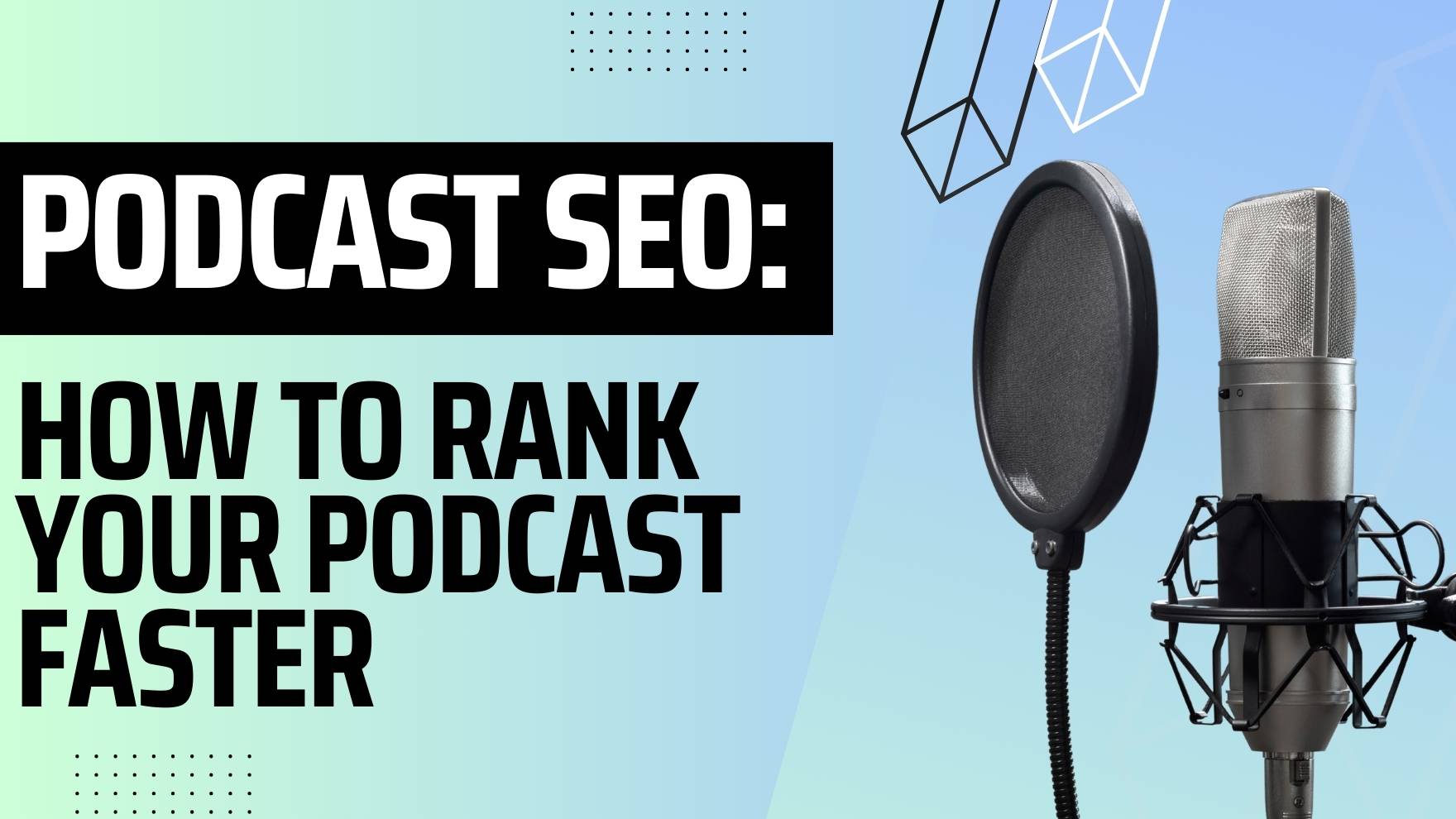
Are you struggling to make your podcast stand out in the sea of content available online?
Launching a podcast is no easy task if you want to do it right. I should know, I’ve launched three podcasts and learned a lot of lessons along the way.
In this article, I’m going to outline some of the biggest tips I’ve learned on the way to creating top 10 podcasts and how you can speed up your success getting there by using the power of SEO to boost your numbers.
With the right strategies, you can turn your podcast into a powerful tool for attracting high-quality organic traffic and expanding your online presence.
Key Takeaways
- How to use a podcast to boost your website SEO
- What important steps you need to take in order to set up your podcast correctly so you can benefit from hosting a podcast on your website
- Keyword optimization tactics for creating episode titles
- Collaberation to generate more followers and links back to your website
The Power of Podcasting for SEO
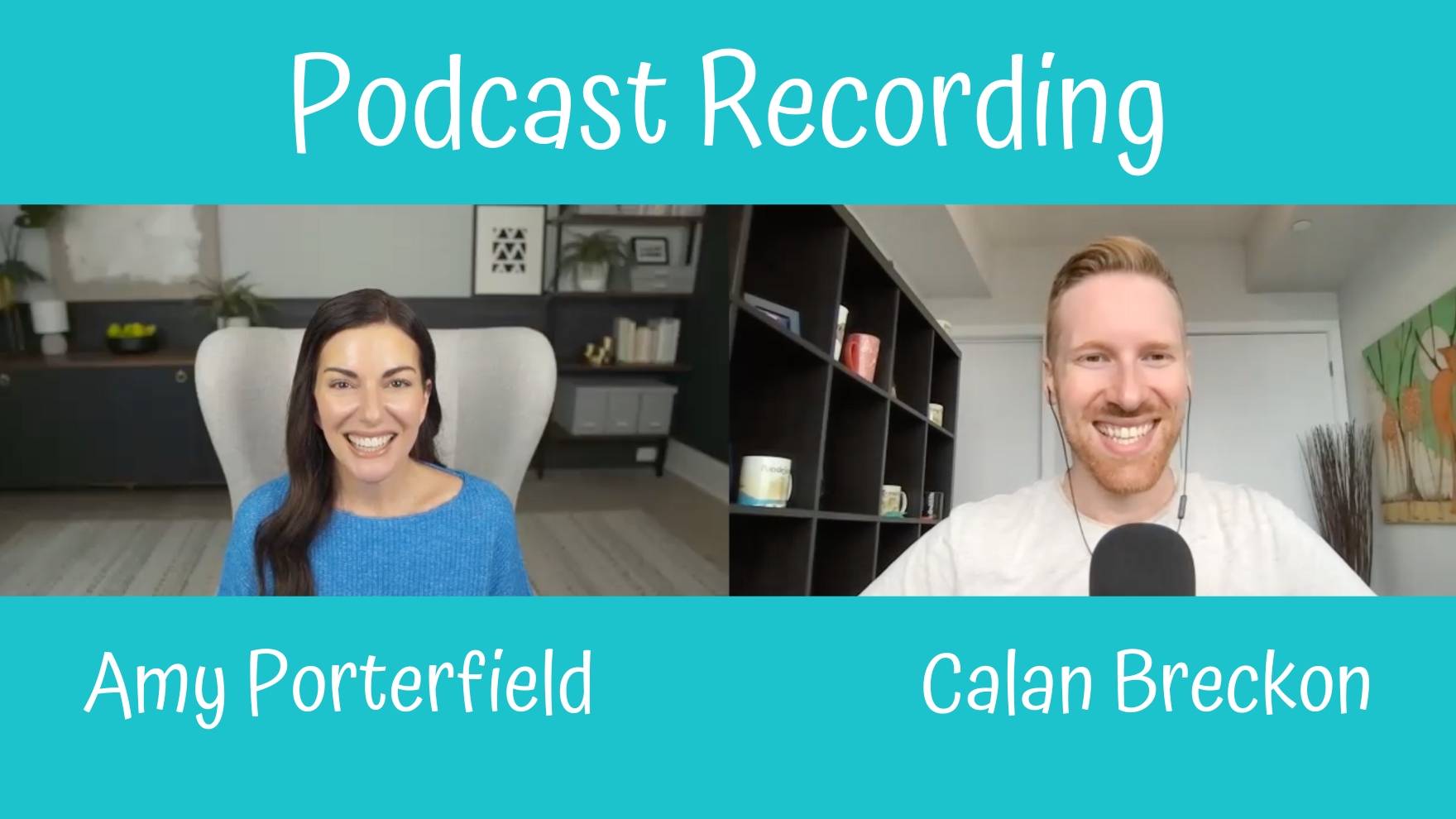
Podcasting offers an excellent opportunity for you to:
- Provide quality content
- Connect with industry specialists
- Drive organic growth
- Create collaboration opportunities
- Build know, like, and trust factor with your audience
Transforming your podcast into crawlable content for your website supplies more material for search engine bots to index and bolster your SEO. (Later in this post, I’ll share exactly what you need to do in order to take advantage of the power of SEO for your podcast).
Optimizing your podcast for SEO can introduce it to new audiences and increase its authority with Google. Instead of just using any podcast hosting platform and publishing your podcast, you’re going to need to set it up in a specific way, but trust me, it is well worth the little bit of extra work.
The second podcast I ever launched is now getting over 50,000 downloads a month without any advertising and it’s a super small niche. Most of that comes from the fact that people could find it on Google when they searched for things in our niche.
Effective methods for optimizing podcasts for search engines include:
- Keyword research
- Strategic keyword placement
- Syndication on top podcast platforms
- Platform optimization
- Creation of dedicated landing pages for each episode (this is important)
- Guest promotion and link sharing
- Internal linking
- Podcast transcripts (again, super important)
Quality Content and Organic Growth
Evergreen topics, which remain useful throughout the years, can be particularly helpful for those looking to start or grow their podcast. To locate suitable evergreen topics for your podcast, focus on what is stimulating and relevant to your target audience.
If we take the business niche, for example, you could do topics on:
- Things that provide valuable insights and advice. People always love “tips and advice” episodes because it gives them actionable steps to take.
- Interviews with successful entrepreneurs. I’ll go more in-depth on this later.
- Case studies of successful businesses
- Strategies for marketing and sales
- Business related current events like trends in the market
When you create evergreen content, it helps boost the chances of your podcast getting noticed because if people like it, they will share it with their friends because they got value out of it. It’s harder to do “what’s trending now” because eventually, that content will be irrelevant. You can still do this style of episode, but it’s good to also include evergreen so that your content can be shared for years to come.
YouTube Podcasting
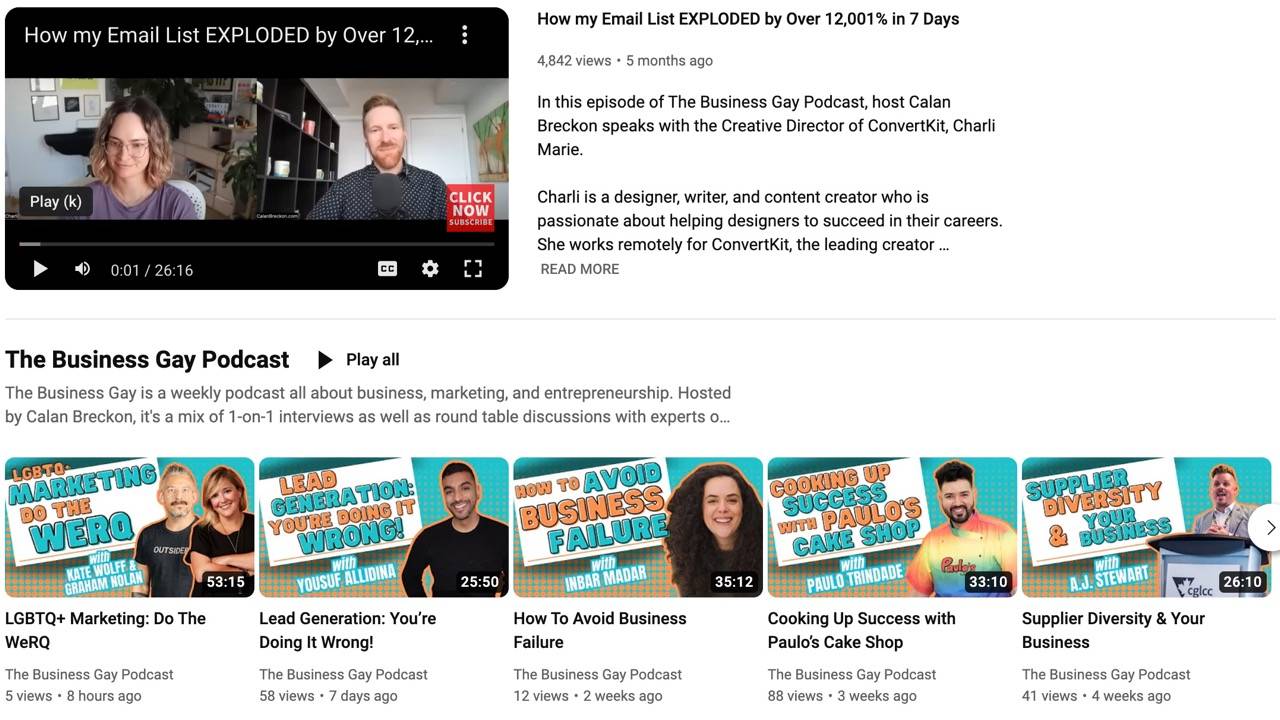
You should be recording video at the same time as you record your audio. It’s just so easy to do and it basically doubles your content without doubling the work to do it. You’re going to be recording it anyway, right?
Not to mention, YouTube is the largest search engine after Google AND quite often Google will show videos from YouTube in search. You cast a much wider net when you’re able to upload both video and audio to all the distribution platforms.
YouTube has even updated its system specifically to host and organize podcasts.
On YouTube, Podcast chapters can have an indirect effect on SEO by enhancing the user experience, which can contribute to the success of your podcast. I like to use the free tool Harpa.ai to make this super easy.
Once I’ve recorded an episode and uploaded the video, I just open the Harpa chrome plugin and use the command “/YouTube Video Summary” and choose the short option. It will spit out about 10 timestamps with descriptions for your chapters that you can then put in your YouTube video description. Ta-da, super easy.
This puts more data and context into your videos for Google and YouTube to read and thus makes it easier for people to find your podcast.
Collaboration Opportunities
Collaborating with guests on podcasts can provide networking opportunities and increased visibility.
Speaking with engaging and well-informed people can generate useful and captivating content, as well as draw in a viewership, which can contribute to building a successful podcast.
My podcast, The Business Gay, is an interview-based podcast series where I use this approach to generate new episodes and listeners. Every time I have a new guest on, they share it with their audience which can lead to new listeners for me. I also get to know these guests and many times have built genuine friendships afterward and also had business deals come my way because of it.
Encouraging my guests to share the show is made easier when I provide them with links to the episode landing page as well as any social media I create. I’ll share more about the landing page later down this page, but for social media, I like to use OpusClip. I just upload my videos and within minutes I have a bunch of ready-to-use short social clips from the show.
Building Backlinks with Podcasts

Utilizing podcasts to generate backlinks can help your podcast gain traction in the competitive world of podcasting.
When I first set up my second podcast using this method, I had NO idea how important it was going to be for our website SEO. All I knew was that we needed to host the podcast on our website so that we could get all that important podcast SEO juice coming our way.
When you set up a podcast like this, instead of your hosting platform getting all that beneficial SEO power, YOU get all of that power. I call this building your podcast asset.
Here are some potential methods for utilizing a podcast to generate backlinks:
- Construct dedicated landing pages for each episode of your podcast, including show notes and links to relevant resources. Castos does this really easily by setting you up with the Seriously Simple Podcasting plug-in for WordPress. It sets everything up for you like it would a blog post and follows a similar setup structure. This is by far the easiest way to go. If you don’t use Castos, then you can still set up each podcast episode as a blog post on your website and then insert an audio player for the episode at the top.
- Encourage guests to promote the podcast on their own websites and social media platforms, including a link back to the podcast page on your website. This is so important if you want to build up that SEO power on your website. Do not skip this step!
- Implement internal linking strategies within your podcast episodes, directing listeners to other relevant episodes or resources on your website. Internal linking is important for website SEO and it helps people find more of your episodes.
- Consider appearing as a guest on other people’s podcasts, where you can share valuable advice and acquire links back to your site. Some people call this borrowing other people’s audiences and it’s a great way to build a following.
By implementing these strategies, you can increase the visibility of your podcast and generate valuable backlinks for your website, which will drive more traffic to your website and podcast.
Creating a Dedicated Landing Page
A dedicated landing page for a podcast episode is a page on an existing website that is exclusively devoted to a particular podcast episode. This is a MUST DO if you want to use your podcast for SEO. To create an effective dedicated landing page for a podcast episode, you need to include the following elements:
- Clear and compelling headline
- Engaging episode description
- Episode player
- Episode cover
You can see an example of what I do for my podcast here.
Basically, this landing page will also serve as the show notes for your show. What I’ve done is created a draft post that acts as my template and every time I have a new episode I need to put together I duplicate the template post and then start editing from there.
It’s important to note that I use WordPress, Castos, and the Seriously Simple Podcasting plugin to host my podcast on my website. I’ve also written a full step-by-step process on how to start and launch a podcast that you can read here.
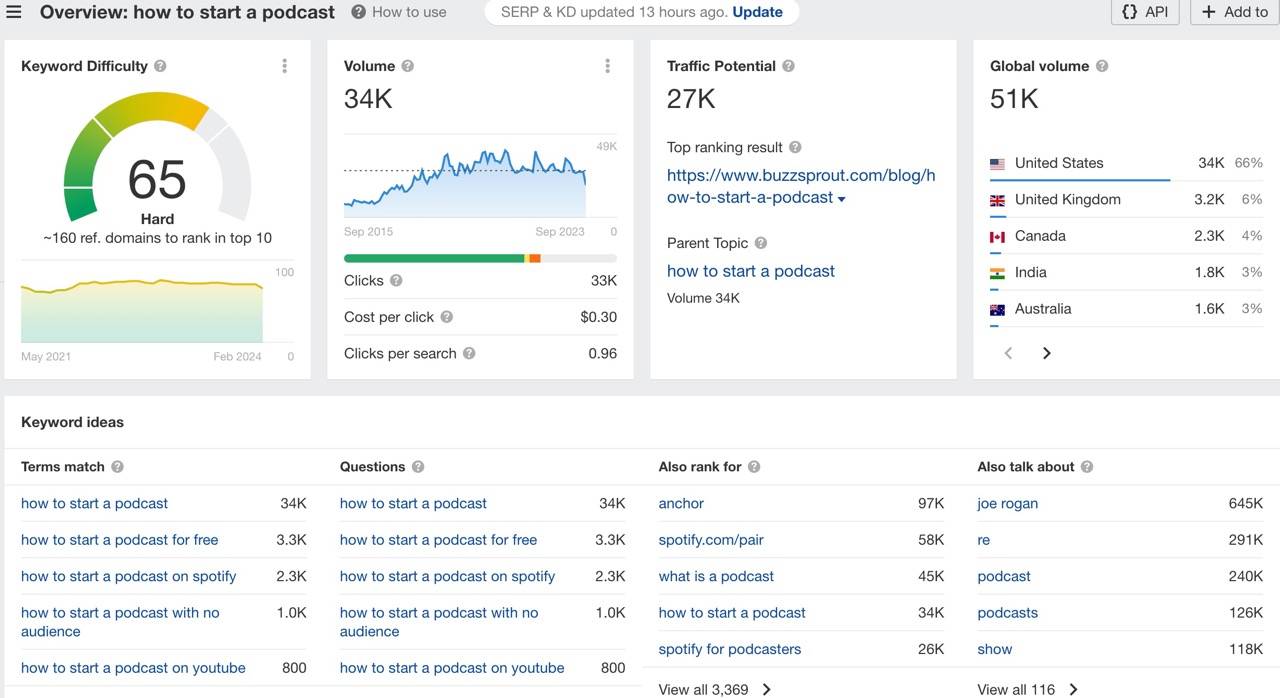
Doing a little bit of keyword research about what to title your episode can really pay off here. The whole point of using a podcast for SEO is so that people can find your podcast naturally and organically in Google Search.
Optimizing the landing page for search engines by including relevant keywords in your show notes is also important, enhancing its accessibility to have Google crawl the content and understand what you’re talking about in the episode.
Including the transcripts on this page is also critical for SEO purposes. I’ll cover transcripts a little later in this post.
Guest Promotion and Link Sharing
Encouraging guests to promote their podcast appearance and share links to your podcast can increase exposure and backlinks, boosting your podcast’s SEO. Here are some strategies to consider:
- Send personalized handwritten thank you cards to your guests. (I once did a guest spot on a podcast and they sent me a SugarWish as a thank you and it was SO sweet – literally)
- Share the episode link on social media and tag the guest.
- Promote the episode on your own podcast and website. At the bottom of each podcast episode page I link 3 other episodes a listener might be interested in.
By implementing these strategies, you can motivate guests to share their episode and increase the visibility of your podcast.
I always make sure to include it in my terms when I have a guest that they need to include a link back from their website to the podcast episode, that way they already know what’s expected from being a guest on the podcast. They get to promote themselves and you get a link back to your website to boost your SEO. It’s a win-win for everyone.
Internal Linking
Internal linking in SEO connects one page on a website to another page on the same website, facilitating navigation for users and giving search engines a clear insight into the structure and hierarchy of the content. Internal linking can enhance the visibility and accessibility of web pages, as well as distribute link authority, and enhance SEO rankings.
Effective implementation of internal linking in a podcast website requires the following steps:
- Post each podcast episode on its own page on your website.
- Be sure to include the show notes and transcripts.
- Go through the transcripts and find words or phrases that match other episodes and then link them to that episode page.
By following these steps, you can improve the internal linking structure of your podcast website and it helps Google to understand the content you are publishing.
Targeting Organic Ranking Keywords through Podcast Content

Targeting organic ranking keywords through podcast content can be achieved by:
- Posting the full transcript of a podcast episode, creating more crawlable content for the website.
- Planning podcast episodes around a keyword, which can facilitate the task of organizing the interview into a post and enhance SEO.
- Focusing on trending topics for podcast episodes, which can offer an immediate boost, particularly in Google Discover.
A little bit of keyword research can go a long way!
Podcast Transcripts
Transcribing a podcast is essential for SEO as it provides text for search engines to index and enhances accessibility for people with hearing impairments. Podcast audio transcriptions are comprehensive, verbatim transcriptions of all dialogue featured on the show, supplying an abundance of written material for the episode page, which helps Google understand what the episode is about.
Google indexes and ranks transcript content for SEO by crawling the text and utilizing it to ascertain the relevance and quality of the content. Transcripts provide supplementary content for Google to index and rank, enhancing the visibility of the podcast in search results.
Publishing podcast transcripts can boost SEO by:
- Providing more indexable content for search engines
- Augmenting visibility in search engine results
- Providing more content for users to read and interact with.
This is a MUST do on each podcast episode page if you want to build that SEO for your website. I like to use an accordion dropdown so that someone can only see the text if they click the + button but Google will still crawl this data. It keeps the page clean looking while still getting the SEO benefits.
Keyword Research
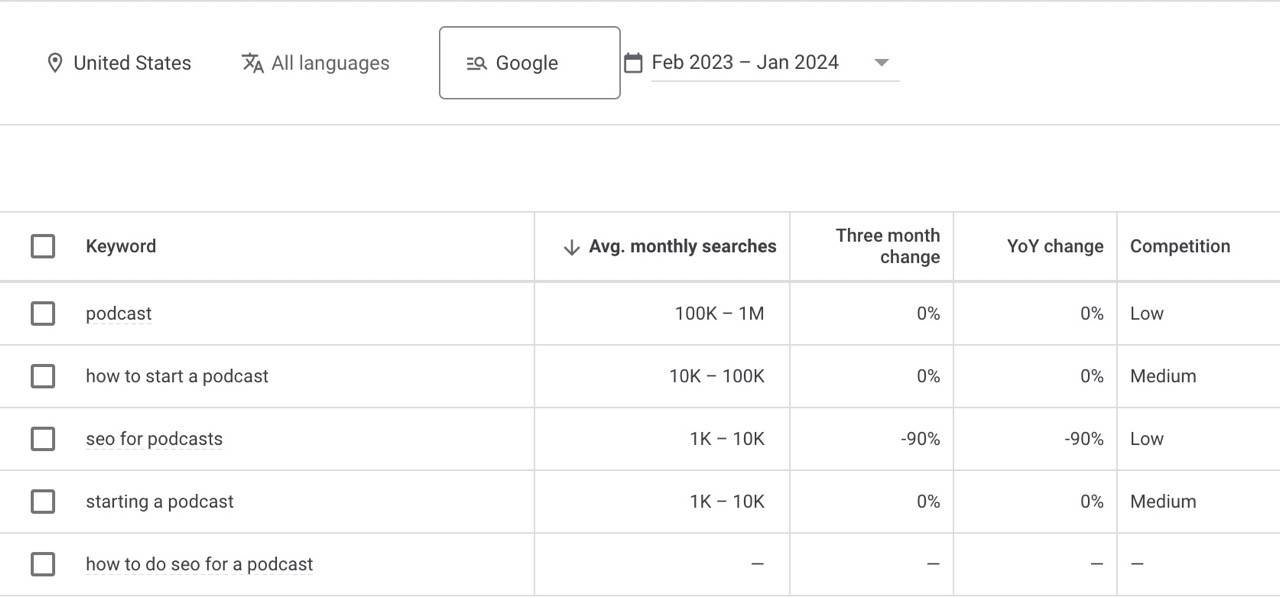
Conducting keyword research with tools like Google Ads Keyword Planner or ahref’s keyword generator can assist in identifying relevant keywords for your podcast. Here’s how to use Google Ads Keyword Planner for podcast keyword research:
- Create a Google Ads account and log in.
- Click on ‘Tools & Settings’ in the upper right corner of the Ads platform.
- Select ‘Keyword Planner’ from the dropdown menu.
- Input keywords associated with the podcast episode in the search bar.
- Examine the search volume and competition data for the keywords.
- Analyze the search intent behind the keywords to comprehend user intent.
- Utilize the keyword data to optimize the podcast content and enhance its visibility in search results.
I do this when I’m trying to decide on an episode title to see which option might get the most search traffic and thus give me a better chance of people organically finding the episode.
Summary
In conclusion, optimizing your podcast for search engines (SEO) is crucial for expanding your online presence and reaching a wider audience. By following best practices for podcast SEO, such as keyword research, strategic keyword placement, creating dedicated landing pages, promoting guests and sharing links, engaging in internal linking, targeting organic ranking keywords through podcast content, and distributing your podcast across top platforms, you can elevate your podcast’s visibility and authority, ultimately improving its overall SEO.
I would never build a podcast any other way after seeing the massive returns for all the podcasts I’ve been part of creating. There is so much upside if you’re willing to take the time and build your podcast correctly from the start.
I hope you’ve gotten a lot out of this article and that it helps you on your podcasting journey!
Frequently Asked Questions
Podcasting CAN help with SEO, if done correctly, as it can be converted into crawlable content for a website, improve brand reputation and visibility, provide opportunities to earn links, and make use of relevant keywords to appear in Google’s search results.
Optimize your podcast for SEO by creating a dedicated page on your website, crafting a clear description, syndicating to all Podcasting platforms, planning episodes around keywords, keeping episode titles and show notes brief and SEO-friendly, and including the transcripts from the episode somewhere on the dedicated page for that episode.
To optimize your podcast for SEO, use keywords in the title, URL, and description of the show.
To start a small business podcast, identify your topic and audience, define your style, source the right equipment and editing software, record and edit your first podcast, and promote it online. If you want help, I wrote a whole step-by-step guide on podcasting for beginners.

